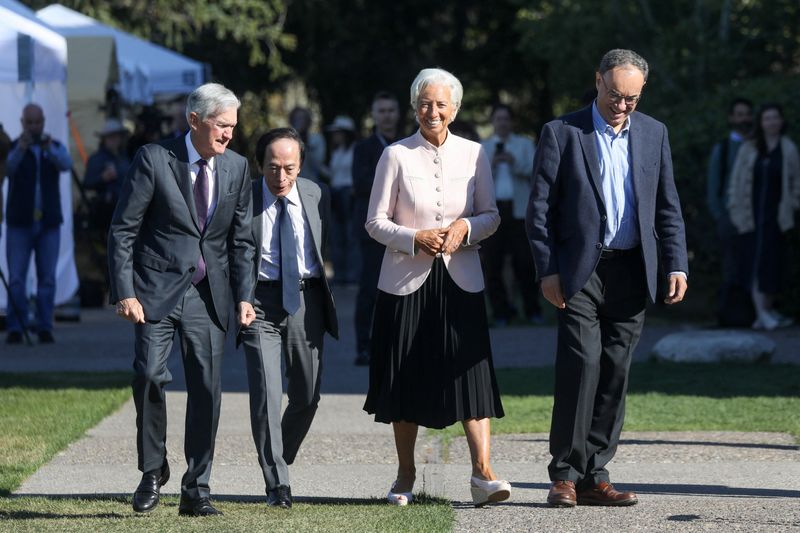Foreign Workers Fuel Euro Zone Growth, Says ECB’s Lagarde Amid Policy Shifts
By Elena Moretti
August 23, 2025
Jackson Hole, Wyoming – European Central Bank (ECB) President Christine Lagarde highlighted the significant role of foreign workers in bolstering the euro zone’s economy during a speech at the Federal Reserve’s Jackson Hole economic symposium on Saturday. Speaking on the theme “Labor Markets in Transition: Demographics, Productivity, and Macroeconomic Policy,” Lagarde credited an influx of foreign labor with offsetting challenges like shorter working hours and declining real wages, helping the 20-nation bloc navigate post-pandemic economic pressures.
Foreign Workers Drive Labor Force Growth
Lagarde noted that while foreign-born workers accounted for just 9% of the European Union’s labor force in 2022, they have driven half of the bloc’s labor force growth over the past three years. “This rise in both the number and participation rate of foreign workers has been a key factor in sustaining economic growth,” she said, citing Germany and Spain as standout examples. In Germany, for instance, GDP would be approximately 6% lower than 2019 levels without the contribution of foreign labor. Spain’s robust post-pandemic recovery also owes much to immigrant workers, she added.
This influx has helped stabilize the euro zone’s unemployment rate, which stood at 6.3% in mid-2025, compared to a projected 6.6% without the added labor supply. Lagarde also pointed to increased participation from older workers as another mitigating factor. Her remarks align with an earlier ECB study from May 2025, which found that foreign workers have alleviated labor shortages and are increasingly filling higher-skilled roles due to improving education levels.
Economic Context and Policy Implications
The ECB’s focus on foreign labor comes as the euro zone grapples with economic stagnation and inflationary pressures. Recent data from Eurostat showed zero growth in the fourth quarter of 2024, with Germany and France contracting by 0.2% and 0.1%, respectively. The ECB has responded with monetary policy easing, cutting its key deposit rate to 2.75% in January 2025, the fifth reduction since June 2024, to stimulate demand amid fading restrictive effects.
Lagarde’s comments underscore the delicate balance the ECB faces. While foreign workers have helped curb inflation by boosting supply—contributing to a decline from post-pandemic highs to 2.4% in December 2024—rising geopolitical tensions and potential trade disruptions, such as U.S. tariffs under President Donald Trump, could complicate the outlook. Lagarde noted at a January press conference that such frictions could increase inflation by raising logistical costs, though she described their impact as “far more complicated” due to possible market adjustments.
Political and Social Backlash
Despite their economic contributions, the influx of foreign workers has sparked political tensions across Europe. Lagarde acknowledged that migration pushed the EU’s population to a record high in 2024, despite declining birth rates, but governments are increasingly imposing curbs in response to domestic discontent. Far-right parties advocating for stricter immigration policies have gained traction in countries like France and the Netherlands, where their contribution to labor growth is less pronounced compared to Germany and Spain.
Posts on X reflect mixed sentiments. Some users praised the economic benefits, with one stating, “Lagarde’s right—foreign workers are keeping the euro zone afloat. Germany’s GDP numbers prove it.” Others expressed skepticism, with a post reading, “Immigration boosts growth, sure, but at what cost to social cohesion? Europe’s walking a tightrope.”
Broader Global Trends
Lagarde’s remarks resonate beyond Europe. Bank of Japan Governor Kazuo Ueda, speaking on the same Jackson Hole panel, noted a similar reliance on foreign labor in Japan to address post-pandemic labor shortages. The ECB’s findings also mirror trends in the U.S., where immigrant workers have helped temper inflation by meeting demand surges, as noted by economists at the symposium.
Looking Ahead
As the euro zone braces for potential trade headwinds and domestic political pressures, the role of foreign workers remains a double-edged sword. Lagarde’s acknowledgment of their contributions signals a nuanced approach to economic policy, balancing growth with social and political realities. The ECB’s data-dependent stance, with further rate cuts anticipated in 2025, suggests continued reliance on labor market dynamics to support recovery.
For now, foreign workers are proving indispensable to the euro zone’s economic resilience, but their long-term integration will depend on policymakers navigating the complex interplay of economics and public sentiment. As Lagarde put it, “The economy has faced headwinds, but rising real incomes and easing monetary policy should pave the way for a pickup in demand.” Whether this optimism holds will be a key storyline in the months ahead.
Elena Moretti is an economic correspondent covering European markets and central bank policies.
